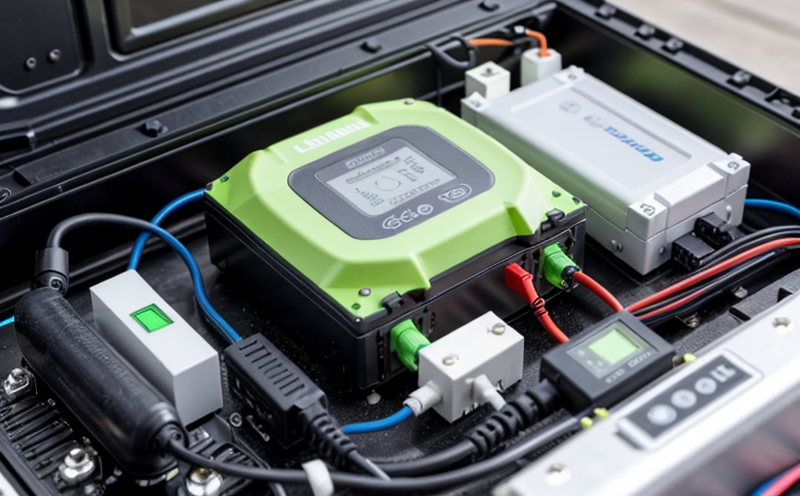ANSI C18.2M Lithium-Ion Battery Testing for Portable Rechargeable Applications
The ANSI C18.2M standard provides comprehensive guidelines and procedures for the testing of lithium-ion (Li-ion) batteries used in portable rechargeable applications. These applications include consumer electronics, medical devices, military equipment, and various industrial tools. The primary goal of this standard is to ensure the safety, reliability, and performance of Li-ion batteries by subjecting them to a series of rigorous tests that simulate real-world conditions.
Under ANSI C18.2M, testing begins with the preparation of the battery specimen according to specific dimensions and specifications outlined in the standard. This step ensures consistency among different batches of batteries being tested. The test procedures cover various aspects such as electrical performance, mechanical durability, thermal stability, and safety under abuse conditions.
Electrical performance tests assess the battery's voltage, capacity, internal resistance, and charge-discharge characteristics. These parameters are crucial for understanding how well the battery will perform in its intended application. Mechanical durability tests evaluate the battery’s ability to withstand physical stresses like vibration or shock without compromising its integrity. Thermal stability tests examine the battery’s response to temperature variations, ensuring it operates safely within specified limits.
The most critical aspect of ANSI C18.2M is the abuse testing, which simulates potential mishandling scenarios that could occur during use or transportation. This includes overcharge, overdischarge, short-circuiting, and mechanical abuse tests. These tests are designed to identify any weaknesses in the battery’s design or manufacturing process before they become a safety hazard.
The results of these tests are meticulously recorded and analyzed to ensure compliance with ANSI C18.2M standards. Compliance officers can use this data to make informed decisions about product quality and safety, while R&D engineers can refine their designs based on the insights gained from testing. Quality managers rely on such comprehensive testing to meet regulatory requirements and maintain a strong market presence.
ANSI C18.2M is widely recognized not only in the United States but also internationally, making it an essential standard for manufacturers aiming to enter global markets. This broad acceptance ensures that products conforming to this standard are readily accepted across different regions, facilitating smoother international trade and compliance with local regulations.
Our laboratory adheres strictly to ANSI C18.2M guidelines when conducting Li-ion battery tests. Our experienced technicians ensure precise specimen preparation, accurate test execution, and reliable data analysis. The comprehensive nature of our testing ensures that every aspect of the battery's performance is thoroughly evaluated, providing clients with confidence in their product’s safety and reliability.
Benefits
The benefits of ANSI C18.2M lithium-ion battery testing extend beyond ensuring regulatory compliance; they also contribute significantly to the quality assurance process for manufacturers. By adhering to this standard, companies can enhance their product’s safety and performance, which translates directly into customer satisfaction and brand reputation.
- Enhanced Safety: Rigorous testing under abuse conditions helps uncover potential hazards early in the development cycle, allowing manufacturers to address them proactively. This proactive approach minimizes risks associated with battery failures that could lead to accidents or injuries.
- Better Performance: Evaluating electrical and mechanical characteristics ensures optimal performance across all intended applications. Consumers benefit from longer-lasting batteries with consistent power output.
- Increased Market Access: Compliance with ANSI C18.2M is a key factor in gaining entry into international markets, particularly those with stringent safety regulations. This standard helps manufacturers meet these requirements, broadening their potential customer base.
- Competitive Advantage: Demonstrating adherence to leading industry standards like ANSI C18.2M can differentiate a company from competitors, attracting more discerning customers who value product quality and reliability.
In summary, ANSI C18.2M lithium-ion battery testing offers numerous advantages for manufacturers, including enhanced safety, better performance, increased market access, and a competitive edge in the marketplace.
International Acceptance and Recognition
- United States: ANSI C18.2M is recognized within the U.S., ensuring compliance with local regulations and facilitating market entry for manufacturers.
- Europe: While not a direct equivalent, this standard aligns closely with European standards like EN 62619, which cover similar aspects of battery safety and performance.
- Asia-Pacific: Manufacturers in Asia-Pacific regions find value in ANSI C18.2M due to its comprehensive approach to ensuring product safety and reliability.
- Australia/New Zealand: Compliance with ANSI C18.2M is accepted as part of broader international standards, facilitating trade between these regions.
The widespread acceptance of ANSI C18.2M in various parts of the world underscores its importance in ensuring product safety and reliability across diverse markets.
Environmental and Sustainability Contributions
The rigorous testing procedures outlined in ANSI C18.2M contribute to environmental sustainability by minimizing risks associated with battery failures that could lead to accidents or injuries. Ensuring the safe disposal of batteries is a critical component of sustainability efforts, and compliant products play a role in this initiative.
By promoting the use of safe and reliable lithium-ion batteries, ANSI C18.2M helps prevent incidents that could result in environmental hazards or waste. This standard supports manufacturers in designing and producing batteries that are not only safe but also environmentally responsible.





